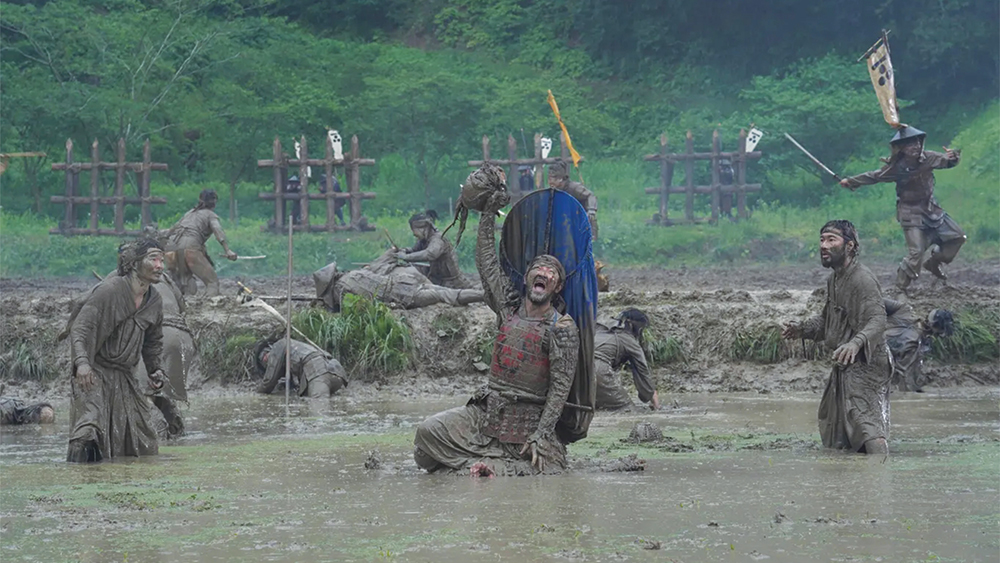Koreeda’s ‘Monster,’ Kitano’s ‘Kubi’ May Get Cannes Box Office Boost
Two Japanese films by internationally renowned auteurs — “Monster” by Koreeda Hirokazu and “Kubi” by Kitano Takeshi — are in the Cannes lineup this year, and both carry with them big box office expectations in Japan.
“Monster,” which is screening in competition, will be released on June 2 by Gaga and Toho, the latter Japan’s largest distributor and theater chain operator. Koreeda’s two previous films — “The Truth” (2019), shot in France, and “Broker” (2022), filmed South Korea — were both box office disappointments in his home market. “Monster,” however, promises a return to the earnings form of his 2018 Palme d’Or winner “Shoplifters,” whose $34 million cumulative total was the fourth-highest among Japanese releases that year.
One reason: The screenplay is by Sakamoto Yuji, a veteran writer of hit TV dramas and films, including the 2021 smash romantic drama “We Made a Beautiful Bouquet.” The story of “Monster,” about a quarrel between elementary school children that results in repercussions for the adults around them, is a Sakamoto original, but plays to Koreeda’s strengths, especially his knack for eliciting outstanding performances from his underage actors.
Also contributing to local media and fan interest in the film is the score by late composer Sakamoto Ryuichi, a major figure on the domestic and international music scene for decades, who won the original score Oscar for the 1987 Bernardo Bertolucci period drama “The Last Emperor.”
While “Monster” had long been tagged for a Cannes competition slot, the selection of the samurai drama “Kubi” for the Cannes Premiere section was something of a surprise. The 76-year-old Kitano’s first film in six years, since the 2017 gangster epic “Outrage Coda,” “Kubi” wrapped in September of 2021 after a five-month shoot, but protracted contract negotiations between Kitano and Kadokawa, the media conglomerate that put up the JPY1.5 billion ($11 million) production budget, reportedly delayed completion and pushed back the film’s release.
“Kubi” had no release date penciled in or even a Japanese website. On April 15, Kitano appeared at a Tokyo presser with members of his main cast, and more details about the film were revealed, including its scheduled fall 2023 opening.
A passion project for three decades, “Kubi” is based on Kitano’s own theory, developed in a novel and screenplay, for the reasons behind a famed incident in Japanese medieval history: The betrayal of warlord Oda Nobunaga by a trusted vassal at Honno-ji temple in Kyoto in 1582 that resulted in Nobunaga’s death by hara-kiri suicide.
Similar to Kitano’s “Outrage” gangster trilogy, the film features a nearly entirely male cast of well-known names. Present as the press conference were Kase Ryo (“Letters From Iwo Jima”), who stars as Nobunaga, and Nishijima Hidetoshi (“Drive My Car”), who plays the vassal, Akechi Mitsuhide.
Kitano commented that his sort of story often features in the period drama series of public broadcaster NHK, while criticizing them as cleaned-up versions of history. “The samurai and warlords were actually bad guys,” he said. “I wanted to depict their cruelty and their way of life, with their life-or-death struggles as the backbone.”
Kitano’s 18 previous films have a checkered box office history, with some flopping and others, such as his 2003 samurai actioner “Zatoichi,” becoming commercial hits. A Cannes selection for his latest is a PR plus, but an award in the competition, which has so far eluded him, despite past wins of Silver and Golden Lions at Venice, would obviously be a bigger boost.
Overall, the Japanese market has long been dominated by anime, with the genre taking the top four spots in the domestic box office rankings for 2022, headed by “One Piece Film Red” with $147 million. Also, live-action films for the multiplexes are typically based on bestselling manga, hit TV series or other proven IP. Nonetheless, Koreeda, Kitano and a handful of other Japanese directors can still attract audiences with auteur cinema. But in Kitano’s case, severed heads — one meaning of “Kubi” — are also part of the attraction.

